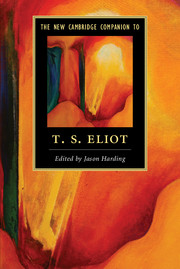Book contents
- Frontmatter
- Contents
- Notes on contributors
- Preface
- Chronology of Eliot's life and works
- List of abbreviations
- 1 Unravelling Eliot
- 2 Eliot: Form and Allusion
- 3 Prufrock and Other Observations
- 4 Banishing the Backward Devils: Eliot's Quatrain Poems and “Gerontion”
- 5 With Automatic Hand: The Waste Land
- 6 “Let These Words Answer”: Ash-Wednesday and the Ariel Poems
- 7 Four Quartets
- 8 “A Precise Way of Thinking and Feeling”: Eliot and Verse Drama 116
- 9 T. S. Eliot as Literary Critic
- 10 T. S. Eliot's Social Criticism
- 11 Gender and Sexuality
- 12 Eliot's Philosophical Studies: Bergson, Frazer, Bradley
- 13 “Anglo-Catholic in Religion”: T. S. Eliot and Christianity
- Select bibliography
- Index
- Miscellaneous Endmatter
5 - With Automatic Hand: The Waste Land
Published online by Cambridge University Press: 01 December 2016
- Frontmatter
- Contents
- Notes on contributors
- Preface
- Chronology of Eliot's life and works
- List of abbreviations
- 1 Unravelling Eliot
- 2 Eliot: Form and Allusion
- 3 Prufrock and Other Observations
- 4 Banishing the Backward Devils: Eliot's Quatrain Poems and “Gerontion”
- 5 With Automatic Hand: The Waste Land
- 6 “Let These Words Answer”: Ash-Wednesday and the Ariel Poems
- 7 Four Quartets
- 8 “A Precise Way of Thinking and Feeling”: Eliot and Verse Drama 116
- 9 T. S. Eliot as Literary Critic
- 10 T. S. Eliot's Social Criticism
- 11 Gender and Sexuality
- 12 Eliot's Philosophical Studies: Bergson, Frazer, Bradley
- 13 “Anglo-Catholic in Religion”: T. S. Eliot and Christianity
- Select bibliography
- Index
- Miscellaneous Endmatter
Summary
Consider the first verse-paragraph that opens The Waste Land:
April is the cruellest month, breeding
Lilacs out of the dead land, mixing
Memory and desire, stirring
Dull roots with spring rain.
Winter kept us warm, covering
Earth in forgetful snow, feeding
A little life with dried tubers.
Summer surprised us, coming over the Starnbergersee
With a shower of rain; we stopped in the colonnade,
And went on in sunlight, into the Hofgarten,
And drank coffee, and talked for an hour.
Bin gar keine Russin, stamm’ aus Litauen, echt deutsch.
And when we were children, staying at the archduke's,
My cousin's, he took me out on a sled,
And I was frightened. He said, Marie,
Marie, hold on tight. And down we went.
In the mountains, there you feel free.
I read, much of the night, and go south in the winter. (CPP 61)
These lines pose an intriguing question: How many people are speaking here? To answer it, we can only scrutinize the text in order to identify the lexical and syntactic patterns that distinguish each individual's speech.
If we begin to do that, we swiftly observe that lines 1–7 are very distinctive. We notice the participial constructions that end many lines: “breeding” (1), “mixing” (2), “stirring” (3), “covering”(5), and “feeding” (6), a pattern that is even repeated once more and reappears at line 8, in “coming over the Starnbergersee.” We also can't miss the use of adjective-noun pairings that occur in these lines, usage so insistent that there are seven of them: “cruellest month” (1), “dead land” (2), “dull roots” and “spring rain” (4), “forgetful snow” (6), and “little life” and “dried tubers” (7). Taken together, then, participial constructions and adjective-noun pairing seem to typify a coherent voice, and we can identify that voice for the moment as Zone 1. Further, we can also identify that voice as masculine, oddly, because we have no idea whatsoever who is speaking the poem's first four lines; yet they sound threatening (“cruellest month” and “dead land”), and minatory speech not assigned to any individual or source is conventionally spoken by a masculine voice.
- Type
- Chapter
- Information
- The New Cambridge Companion to T. S. Eliot , pp. 71 - 88Publisher: Cambridge University PressPrint publication year: 2016



